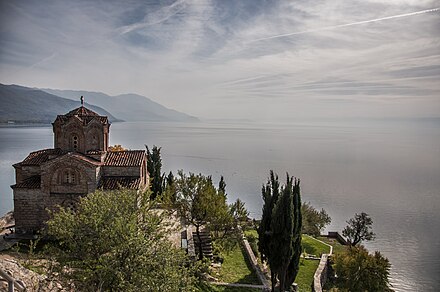Western North Macedonia
Western North Macedonia
A land of scenic mountains, lakes, forests, and fields sandwiched between the Povardarie region and Albania, Western North Macedonia is where a casual traveller will likely spend most of their time in North Macedonia as it houses most of the attractions that North Macedonia is known for.
Regions
{{mapshape|type=geoshape|fill=|title=Polog|wikidata=Q2604025}} {{mapshape|type=geoshape|fill=|title=Prespa|wikidata=Q73414}}
Cities
- Bitola 📍 (Битола) — one of the most European-flavoured cities in the country, Bitola is known for its colourful neo-classical architecture and the Ancient Macedon ruins of Heraclea Lyncestis nearby
- Debar 📍 (Дебар)
- Demir Hisar 📍 (Демир Хисар)
- Gostivar 📍 (Гостивар)
- Kičevo 📍 (Кичево, Kichevo)
- Kruševo 📍 (Крушево, Krushevo) — a museum-city nestled high up in the mountains of southwestern North Macedonia; it is one of the most historically significant destinations in the country as it was the site of a revolt against the Ottoman Empire; also home to great skiing
- Makedonski Brod 📍 (Македонски Брод) — situated in a historic region home to Macedonia's largest caves
- Ohrid 📍 (Охрид) — with ancient churches and flower-filled balconies in the hillside old city, and beach life down below on the lake coast, this is no doubt the "Macedonian Riviera"
- Resen 📍 (Ресен) — home to Saraj Castle built in the beginning of the 20th century
- Prilep 📍 (Прилеп) — tobacco fields, medieval monasteries, and strange rocks
- Struga 📍 (Струга) — on the northern shore of the lake, Struga is a smaller, quieter, cheaper, but less fun alternative to Ohrid
- Tetovo 📍 (Тетово) — unofficial capital of the Albanians of North Macedonia, Tetovo is the site of the one of the most distinctive mosques in the world, the Painted Mosque
- Vevčani 📍 (Вевчани, Vevchani)
Other destinations
- Galičica National Park 📍
- Mavrovo National Park 📍
- Pelister National Park 📍
- Brajčino 📍 (Брајчино) — picturesque village in the mountains of Western North Macedonia, just off the eastern shore of Lake Prespa.
- Mariovo
Understand
 Escape Skopje past the mountains towards west, and one of the first thing you notice in the landscape are the red Albanian flags of the double-headed eagle, small and huge, flying everywhere: houses, utility posts, gas stations. If it's summer, you can also see long queues of cars celebrating a wedding, again flying the eagle banners. Don't worry—you have not crossed unknowingly into Albania, this region is where the Albanians of North Macedonia mainly live. They seem to be a pretty nationalistic community, and the ethnic identities play an important role in daily lives in this country.
Escape Skopje past the mountains towards west, and one of the first thing you notice in the landscape are the red Albanian flags of the double-headed eagle, small and huge, flying everywhere: houses, utility posts, gas stations. If it's summer, you can also see long queues of cars celebrating a wedding, again flying the eagle banners. Don't worry—you have not crossed unknowingly into Albania, this region is where the Albanians of North Macedonia mainly live. They seem to be a pretty nationalistic community, and the ethnic identities play an important role in daily lives in this country.
Then move towards the mountains to south, where the ancients named "the land of the lynx", and south of Kičevo, the minarets give way for the belfries and huge hilltop crosses, and the Albanian banners for the flag of the Macedonian sun. With a small chapel clinging to the mountainsides now and then, the lush scenery on the other side of the window keeps going like this, until you reach the territory of multiculturalism back in Ohrid.
Get in
Buses from Skopje depart for most, if not all, of the towns in Western North Macedonia. Some of them have a train service, too, with one particular exception being Ohrid.
- Eurobus - international coach operator that has almost daily buses from Austria, Germany, Switzerland, Italy and Slovenia. Stops in the major cities Skopje, Tetovo, Ohrid. Prices from €70.
Get around
Again, buses will be your most likely mode of transportation in the region. Those preferring to self-drive have little to worry about in the flatlands of the north, where a motorway/toll-road forms the backbone of the local traffic between Skopje, Tetovo, and Gostivar. However, in the mountainous realm south of Gostivar, you are back into the narrow Yugoslav-era roads full of sharp turns, yet no signs warning the drivers against them—late night driving is best left to the locals.
See
Do
Eat
Drink
Stay safe
Go next
- Skopje, the national capital, and the rest of the Vardar Region lies to east
- Albania is easily accessible with five border crossings
- Greece in the south has no public transport connection with the region but you can haggle with a taxi driver in Bitola to take you to the border post
- Kosovo is also within reach, thanks to buses from Tetovo